When Nicolas Sarkozy left the French presidency following his defeat by François Hollande in presidential elections in May 2012, a lavish gravy-train ‘retirement’ began, courtesy of the French taxpayer.
Mediapart has gained access to documents obtained by EELV Green party militant and anti-corruption campaigner Raymond Avrillier which catalogue the staggering generosity afforded to Sarkozy by the public purse between May 2012 and December 2014.
Until now the precise costs have never been revealed. Avrillier received the information, reproduced below, after four months of lobbying the department in charge of overseeing the perks paid to former presidents, which is based at the French prime minister’s office. Avrillier, 67, has long campaigned against political corruption, latterly exposing the use of public money by the French presidency under Sarkozy to pay for opinion polls to establish the popularity of the latter's political rivals.
Sarkozy, whose personal offices alone last year cost the state 215,392 euros in rent and maintenance, continues to benefit from the system that gratifies former French heads of state despite his return to active politics last year and his election in November as head of the conservative opposition party, the UMP. His situation, in which it is unclear how much of his political activity is now funded by the taxpayer, was described by socialist Member of Parliament (MP) Yan Galut in an opinion article published on the website of French weekly l’Obs last December as “a delirious schizophrenia”. Galut and four other socialist MPs called on Sarkozy to assume his return to the political fray by declining the subsidies.
Sarkozy has not only five public servants at his disposal, but also five hand-picked ‘advisors’, including the half-sister of his wife Carla Bruni, whose salaries are all paid from the public purse, representing more than 660,000 euros per year, as is also the purchase and maintenance of his chauffeur-driven, top-of-the-range Citroën C6 limousine.
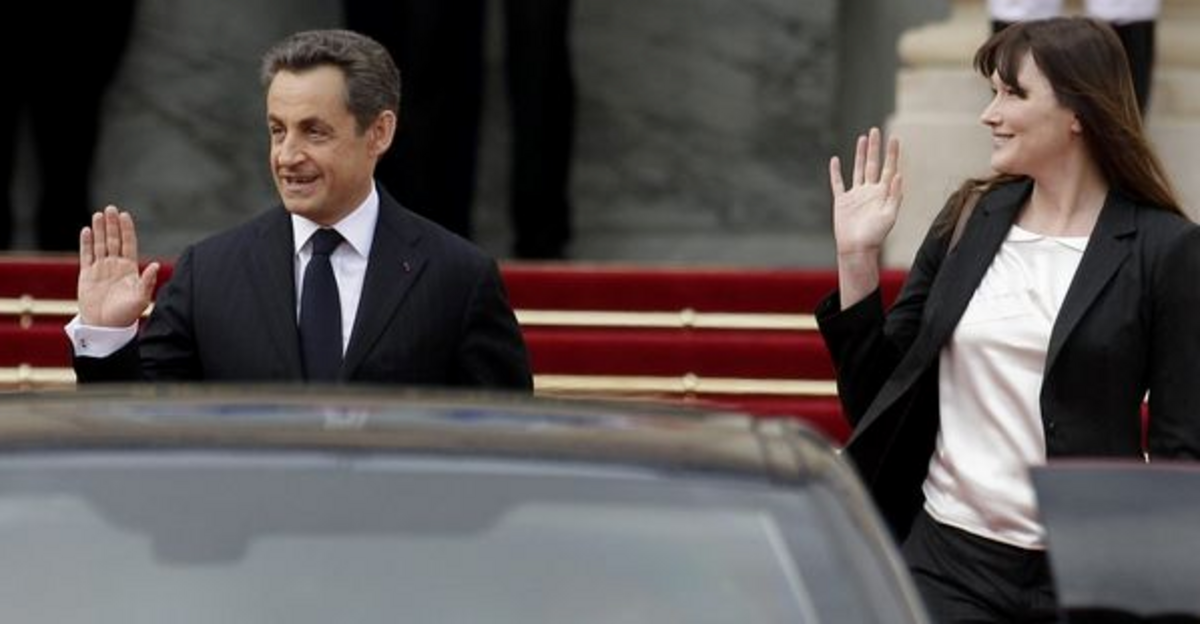
The privileges are common to all former French presidents ever since a decision taken 30 years ago by Laurent Fabius, then socialist prime minister (and who is now French foreign minister). Fabius detailed the nature of the perks in a type-written letter dated January 1985.
The two other surviving former presidents, Valéry Giscard d'Estaing (in office between 1974 and 1981) and Jacques Chirac (who served from 1995 to 2007), also benefit from the system, which is estimated to cost the French taxpayer between 1.5 – 2 million euros per former president per year. However, Giscard d’Estaing, 88, and Chirac, 82, are no longer in active politics.
In June 2012, three weeks after his defeat by François Hollande, Sarkozy set up his personal offices at number 27, rue de Miromesnil, a stone’s throw from the presidential offices, the Elysée Palace, in the upmarket 8th arrondissement in central Paris.
The 56,724 euros that was the cost of fitting out his new office, both in furniture and equipment (see the detail below), was paid out of public funds, as was the invoice from the removals firm which transported his belongings from the Elysée Palace (a total of 8, 513 euros).
Below: the inventory of furniture and fittings paid from public funds for Nicolas Sarkozy's offices on the rue de Miromesnil in May 2012:
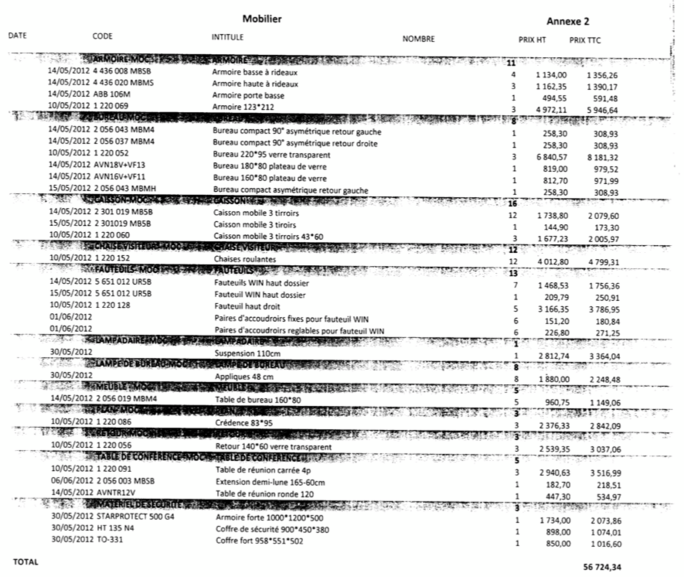
Enlargement : Illustration 2

The items for his new office intriguingly included two safe-boxes (1,074 euros and 1,016 euros) and a vault (2,073 euros), together with furniture and office equipment that included six desks, one “in transparent glass”, two meeting tables (one round, one square), a sofa, three armchairs and “fixed and adjustable arm-rests”, a coat hanger, lighting fixtures, a colour printer, desk-top computer, and a smartphone.
Along with this, the 16,341-euro monthly rent for his offices (196,092 euros per year) was - and continues to be - paid out of public funds.
The documents obtained by Raymond Avrillier reveal that, in 2014, the total cost in rent, maintenance and petty expenses of the offices came to 215,392 euros. This includes cleaning and electricity charges, but also the costs of items such as sheets of paper and stamps and phone bills: the latter amounted to 11,119 euros for mobile phone charges, and 4,720 euros for landline phones.
Over the two-and-a-half years to December 2014, the furnishing, renting and maintenance of the offices on the rue de Miromesnil have cost the French taxpayer more than 570,000 euros. That was no discouragement to Sarkozy, who receives among other payments a monthly payment of 6,000 euros for life as a former president - from also claiming from the public purse a 284-euro dry-cleaning bill in 2013.
In October last year, shortly before his election as head of the UMP party, Sarkozy gave an interview to French daily Le Figaro setting out his policy propositions, in which he spoke of the necessity of reducing public spending in France - “spending creates deficit, which creates debt”, he said - including a significant reduction in public-sector employees (he enjoys the services of five supplied by the state) and of reforming state benefits paid to those on lowest incomes. “I well see that the French, who work and pay so many charges, don’t understand why others manage to live, sometimes better than they, solely thanks to benefits”, he commented.
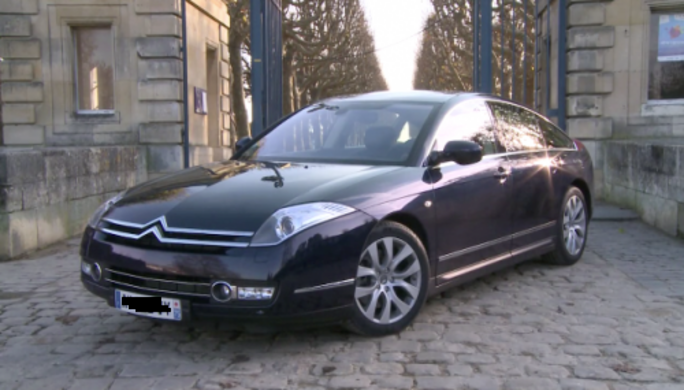
Sarkozy, who has over the past two years enjoyed a lucrative part-time job as an international conference speaker, has repeatedly insisted on the urgent need for reducing public spending further than the reforms of the current socialist government. Meanwhile, five days after his defeat in the May, 2012 elections, he ordered a top-of-the-range Citroën C6 luxury saloon, paid for by the public purse (see invoice below). The C6 V6 HDI Exclusive model, equipped with an electric sunroof and ‘lounge pack’ interior, cost 44,141 euros. The French taxpayer also foots the bill for fuel costs (4,046 euros per year), and servicing (5,301 euros per year).
Below: the 2012 sale agreement for Nicolas Sarkozy's Citroën C6, paid for out of public funds.
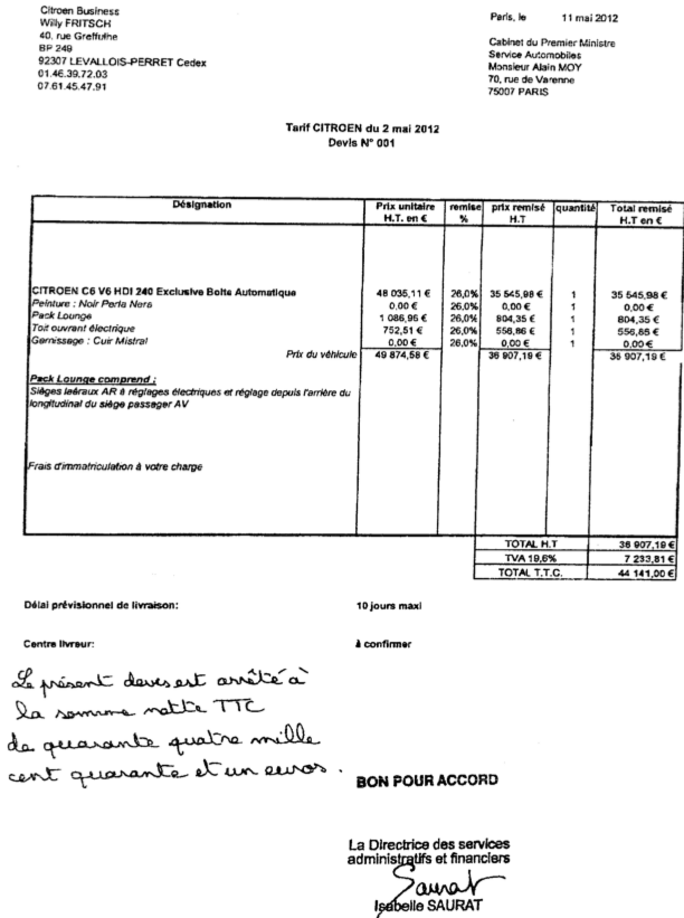
Enlargement : Illustration 4

Sarkozy has a staff of ten people, all paid by public funds. These are five public service workers – including two chauffeurs – and five other people, including private advisors hand-picked by Sarkozy. The latter earn between 5,247 and 7,020 euros per month after deductions. They include Consuelo Remmert, the half-sister of Sarkozy’s wife Carla Bruni, who acts as his ‘diplomatic advisor’ and who is in charge of promoting Sarkozy as a conference speaker to banking institutions and other organisations.
Below: the net salaries of Nicolas Sarkozy's ten staff, paid for out of public funds.
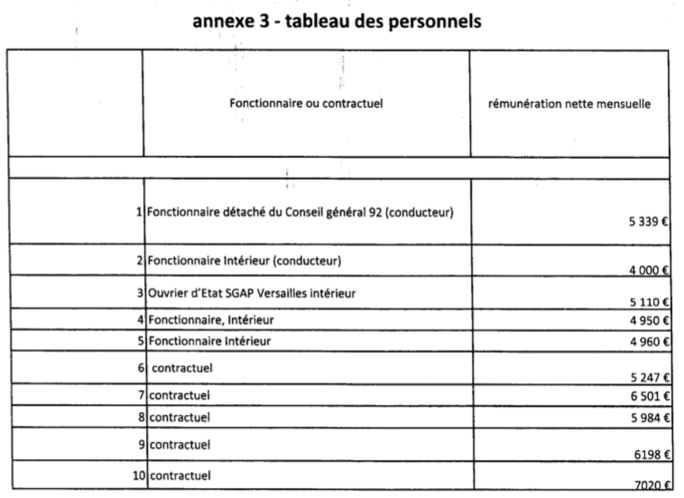
Enlargement : Illustration 5

Of the two chauffeurs on the public payroll, one is provided by the interior ministry (paid 4,000 euros net per month). It is unclear why the other is on loan from the general council of the Hauts-de-Seine département (county) that flanks west Paris, and which was headed by Sarkozy from 2004 to 2007. Sarkozy’s son, Jean Sarkozy, is currently vice-president of the council.
Milking a deficit-ridden state
Over the two-and-a-half years to December 2014, the costs to the state of the net salaries of his staff can be estimated at about 1.6 million euros, without counting the gross salary costs which would include mandatory social benefits charges.
As for the cost of the police protection unit who permanently watch over Sarkozy, Raymond Avrillier was told by the French prime minister’s office that this could not be divulged for security reasons.
Questioned by Mediapart, Sarkozy’s public relations officer, Véronique Waché, said he would continue to benefit from the state-funded offices and staff on the rue de Miromesnil, despite his new role as head of the UMP party.”He remains a former president,” Waché said. “The 1985 circular applies as [it does also] for Chirac and Giscard [d’Estaing]. He [Sarkozy] works three days a week at the UMP and two days at the rue Miromesnil, where non-political meetings are organised with diplomatic or civil society figures who come not to see the president of the UMP but the former head of state.” She added that there were two sets of staff, rue de Miromesnil and at the UMP, “so that there’s no ambiguity”.
Waché, employed by Sarkozy, said she would be leaving her job on the rue de Miromesnil “and change employer to become 100% UMP”. Waché said Consuelo Remmert would continue in her role as Sarkozy’s state-paid ‘diplomatic advisor’ because “there are functions of diplomatic representation to be ensured”.
The blurring of bounderies on the rue de Miromesnil is illustrated in the photo below, a screenshot from a TF1 TV channel current affairs programme, Sept à Huit. Frédéric Péchenard, Sarkozy's campaign director during his bid for leadership of the UMP, is seen in a meeting last September with Sarkozy's long-standing friend and political ally Brice Hortefeux, then serving as his advisor.
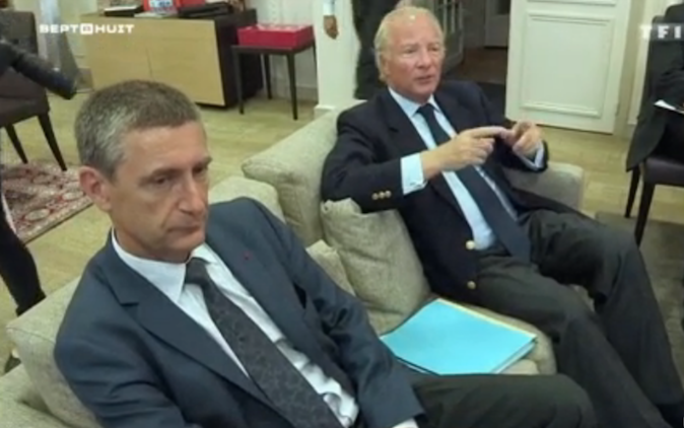
Enlargement : Illustration 6

Raymond Avrillier intends to mount a challenge to Sarkozy’s right to continue receiving such lavish generosity from public funds. He says he believes it would be “reasonable” that Sarkozy is provided with security protection, and which could include the use of the luxury Citroën, and “one or two secretaries” to answer mail. “But for the rest,” he says, “since he has been elected president of the UMP, the question is raised about the use of this public money for political ends.”
Avrillier will now approach the French national commission on political funding (the Commission nationale des financements politiques, or CNCCFP), whose role is to ensure the political parties respect financing regulations, to investigate whether part of Sarkozy’s state-paid perks should be regarded as benefitting the UMP.
That question also applies to Sarkozy’s travel costs – or rather, lack of them. Under the 1985 decision to provide former presidents with the generous package of benefits, Laurent Fabius detailed that they would also receive free travel “for themselves and their spouses” across the whole of French publicly-run rail, air and maritime transport, and “in the highest class”.
In June 2013, Carla Bruni, a millionaire in her own right, caused outrage among Air France employees after it was revealed that she had thus travelled to New York on a return 1st class ticket worth 11,000 euros paid for by the struggling airline - just after it had announced staff cuts.
-------------------------
- The French version of this article can be found here.
English version by Graham Tearse


